
The Band was a Canadian-American rock band formed in Toronto, Ontario, in 1967. It consisted of Canadians Rick Danko, Garth Hudson, Richard Manuel, Robbie Robertson, and American Levon Helm. The Band combined elements of Americana, folk, rock, jazz, country, and R&B, influencing musicians such as George Harrison, Elton John, the Grateful Dead, Eric Clapton and Wilco.
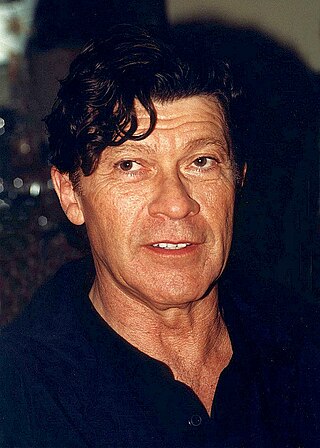
Jaime Royal "Robbie" Robertson was a Canadian musician. He was lead guitarist for Bob Dylan in the mid-late 1960s and early-mid 1970s, guitarist and songwriter with the Band from their inception until 1978, and a solo artist.

"The Night They Drove Old Dixie Down" is a song written by Robbie Robertson and originally recorded by the Canadian-American roots rock group The Band in 1969 and released on their eponymous second album. Levon Helm provided the lead vocals. The song is a first-person narrative relating the economic and social distress experienced by the protagonist, a poor white Southerner, during the last year of the American Civil War, when George Stoneman was raiding southwest Virginia.
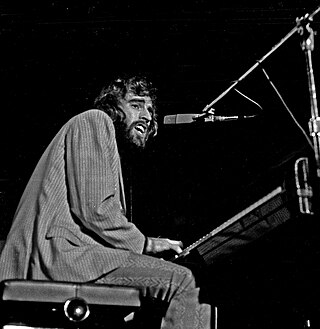
Richard George Manuel was a Canadian musician, singer, and songwriter, best known as a pianist and one of three lead singers in the Band, for which he was posthumously inducted into the Rock and Roll Hall of Fame in 1994.

Jericho is the eighth studio album by Canadian-American rock group the Band. Coming seventeen years after their "farewell concert", it was released in 1993 and was the first album to feature the latter-day configuration of the group, as well as their first release for the Rhino subsidiary Pyramid Records.

Jubilation is the tenth and final studio album by Canadian/American rock group the Band. Recorded in the spring of 1998 in Levon Helm's home studio in Woodstock, New York, it was released on September 15, 1998. For the first time since the group reformed without guitarist and songwriter Robbie Robertson, there were more originals than covers. Songs include "Last Train to Memphis", featuring guest guitarist Eric Clapton, Garth Hudson's solo instrumental closer "French Girls", Rick Danko's "High Cotton" and the ode to Ronnie Hawkins, "White Cadillac".

"The Stones I Throw (Will Free All Men)" is a single by Levon and the Hawks, released in 1965 on Atco Records. It was their first release under this name, following their previous single under the name Canadian Squires. Seemingly a comment by Robbie Robertson in favor of the Civil Rights Movement, the song is carried by Garth Hudson's organ, and is far less rooted in the heavy R&B stylings of the group's other three single sides. It is the link between their days with Ronnie Hawkins and the group's breakout 1968 LP, Music from Big Pink. In December, 1965 the song reached #22 on the CHUM Chart.
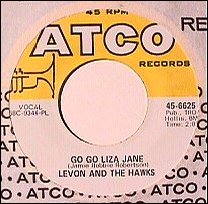
"Go Go Liza Jane" is a single by Levon and the Hawks, released in 1968 by Atco Records in order to capitalize on the growing success of the Band, who had recorded the track along with two others in 1965 as Levon and the Hawks. The song, an upbeat version of the traditional "Little Liza Jane", demonstrated, three years before their debut LP, the way in which the voices of the singers in the Band, Rick Danko, Richard Manuel and Levon Helm, meshed brilliantly. Each also took turns singing lead.
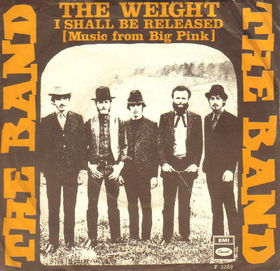
"The Weight" is a song by the Canadian-American group the Band that was released as a single in 1968 and on the group's debut album Music from Big Pink. It was their first release under this name, after their previous releases as Canadian Squires and Levon and the Hawks. Written by Band member Robbie Robertson, the song is about a visitor's experiences in a town mentioned in the lyric's first line as Nazareth. "The Weight" has significantly influenced American popular music, having been listed as No. 41 on Rolling Stone's 500 Greatest Songs of All Time published in 2004. Pitchfork Media named it the 13th best song of the 1960s, and the Rock and Roll Hall of Fame named it one of the 500 Songs that Shaped Rock and Roll. PBS, which broadcast performances of the song on Ramble at the Ryman (2011), Austin City Limits (2012), and Quick Hits (2012), describes it as "a masterpiece of Biblical allusions, enigmatic lines and iconic characters" and notes its enduring popularity as "an essential part of the American songbook."
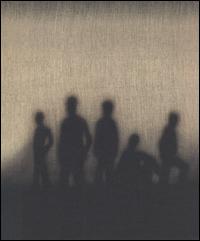
A Musical History is the second box set to anthologize Canadian-American rock group the Band. Released by Capitol Records on September 27, 2005, it features 111 tracks spread over five compact discs and one DVD. Roughly spanning the group's journey from 1961 to 1977, from their days behind Ronnie Hawkins and Bob Dylan through the departure of Robbie Robertson and the first disbanding of the group. The set includes highlights from each of the group's first seven studio albums and both major live recordings and nearly forty rare or previously unreleased performances.
"Acadian Driftwood" is a song by the Band. It was the fourth track on their sixth studio album Northern Lights – Southern Cross (1975), written by member Robbie Robertson. Richard Manuel, Levon Helm and Rick Danko trade off lead vocals and harmonize on the chorus.
"King Harvest (Has Surely Come)" is a song by The Band, which originally appeared as the final track on their second album, The Band.

"Stage Fright" is the title track of the Band's third album, Stage Fright. It features Rick Danko on lead vocals and was written by Robbie Robertson. According to author Barney Hoskyns, Robertson originally intended it to be sung by Richard Manuel but it became clear that the song was better suited to Danko's "nervous, tremulous voice."

"Life is a Carnival" is the opening track of the Band's fourth album, Cahoots. Written by Rick Danko, Levon Helm, and Robbie Robertson, the song features horn arrangements by New Orleans musician Allen Toussaint. The song is the only track from the Cahoots album included on the original releases of Rock of Ages and The Last Waltz. The song was featured in the Bill Murray movie Larger Than Life.

"The Shape I'm In" is a song by The Band, first released on their 1970 album Stage Fright. It was written by Robbie Robertson, who did little to disguise the fact that the song's sense of dread and dissolution was about Richard Manuel, the song's principal singer. It became a regular feature in their concert repertoire, appearing on their live albums Rock of Ages, Before the Flood, and The Last Waltz. Author Neil Minturn described the song as "straightforward rock." Along with "The Weight," it is one of the Band's songs most performed by other artists. It has been recorded or performed by Bo Diddley, The Good Brothers, The Mekons, The Pointer Sisters, She & Him, Marty Stuart and Nathaniel Rateliff and the Night Sweats.
Lonesome Suzie is a 1968 song by The Band written and sung by Richard Manuel originally appearing on their influential debut album Music From Big Pink It was also released on Across The Great Divide, a compilation box set from 1994. Drummer Levon Helm has said that "...Lonesome Suzie was Richard's failed attempt to write a hit record." It never charted and is one of the few songs on which Manuel contributed writing, but is also recognized as one of Manuel's signature pieces. In 1970 it was released as the B-side of the French single release of "Whispering Pines".
"Sleeping" is a song by The Band, first released on their 1970 album Stage Fright. It was also released as the B-side to the "Stage Fright" single. It was co-written by Robbie Robertson and Richard Manuel. This and “Just Another Whistle Stop” are the only two songs Manuel receives credit for on the album. Music critic Barney Hoskyns rates it as "one of Richard [Manuel's] liveliest performances" and "one of The Band's most intricate arrangements." The Band never featured the song on a live album.
"Jemima Surrender" is a song written by Levon Helm and Robbie Robertson. It was first released on the Band's self-titled album in 1969. Usual Band drummer Levon Helm played guitar and sang the lead vocal while usual Band pianist Richard Manuel played drums. The song's lasciviousness helped inspire Naomi Weisstein to form the Chicago Women's Liberation Rock Band.
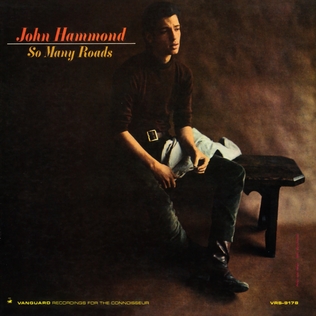
So Many Roads is a 1965 studio album by John P. Hammond, backed by several musicians who would go on to form The Band.

The Night They Drove Old Dixie Down: The Best of the Band Live in Concert is a 1990 compilation of live recordings from American roots rock group the Band released by CEMA Special Markets.














